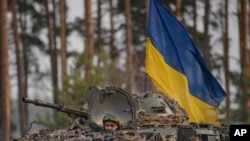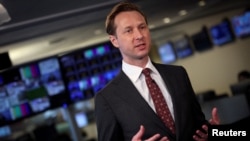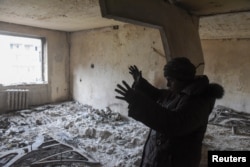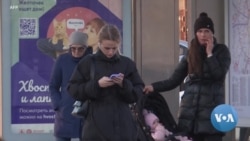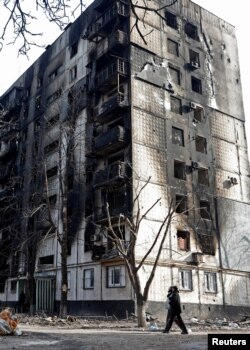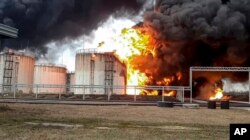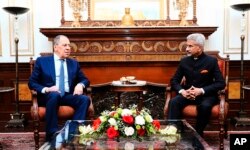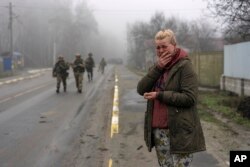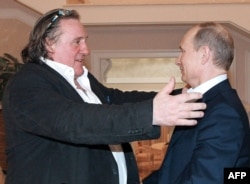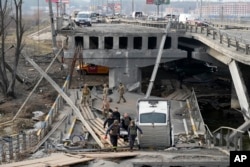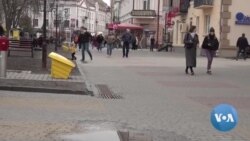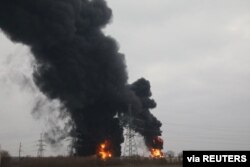For full coverage of the crisis in Ukraine, visit Flashpoint Ukraine.
Recap of April 1
FIGHTING
* "Huge" battles are being fought to the north and east of Kyiv, the mayor of the Ukrainian capital said Friday.
* Chernihiv Governor Viacheslav Chaus said some Russian troops had pulled back from there, but some remained in his region.
* For the first time, Amnesty International field investigators in Ukraine have independently verified physical evidence of banned cluster munitions, the use of which violates international law.
HUMANITARIAN
* The International Committee of the Red Cross said Friday that it was not able to reach Ukraine’s besieged southern city of Mariupol nor to facilitate the safe passage of civilians out.
* A senior Ukrainian official said a total of 6,266 people were able to evacuate and flee the violence, including more than 3,000 from the besieged southern city of Mariupol.
DIPLOMACY
* Ukraine and Russia resumed peace talks on Friday in an online format.
* Ukraine on Friday denied attacking a fuel depot inside Russia.
* Ukraine’s Prime Minister Denys Shmyhal welcomed European Parliament President Roberta Metsola on a visit to Ukraine’s capital Kyiv Friday, saying on Twitter that her trip “is a powerful signal of political support.”
SANCTIONS
* Russia allowed gas to keep flowing to Europe on Friday despite a deadline for buyers to pay in rubles or be cut off.
* Kazakhstan will not help Russia to evade Western sanctions imposed on Moscow over its ongoing invasion of Ukraine, a top Kazakh official has said.
NUCLEAR CONCERNS
* Ukraine’s foreign minister says that now his country’s government is back in control of the Chernobyl nuclear site, it will work with the U.N.’s International Atomic Energy Agency to determine what the occupying Russians did there and mitigate any danger.
* U.N. nuclear watchdog chief Rafael Mariano Grossi says he will lead a mission to Ukraine’s Chernobyl nuclear facility as soon as possible.
For the latest developments of the conflict between Russia and Ukraine, all times EDT:
8:05 p.m.: The U.S. Department of Defense notified Congress on Friday that it will provide up to $300 million more in security assistance to Ukraine, to include laser-guided rocket systems, drones, and commercial satellite imagery services.
"This announcement represents the beginning of a contracting process to provide new capabilities to Ukraine’s Armed Forces," Defense Department spokesman John Kirby said in a statement
7:25 p.m.: Ukrainian cities, including Kyiv, remained under heavy bombardment from Russian forces Friday despite a Russian pledge earlier in the week to deescalate its military campaign in the north of the country.
Kyiv Mayor Vitali Klitschko said Friday that huge battles were also being fought north and east of the capital.
"The risk of dying [in Kyiv] is pretty high," he said. "My advice to anyone who wants to come back is, 'Please, take a little bit more time.' "
6:50 p.m.: A senior Ukrainian official said 6,266 people were able to evacuate and flee the violence, including more than 3,000 from the besieged southern city of Mariupol.
The escape of so many civilians from Mariupol came despite a failed attempt to evacuate even more people from the city that U.S. defense officials said had been "decimated" by Russian airstrikes and missile attacks. VOA's Jeff Seldin has the story.
5:22 p.m.: Burned-out Russian tanks, cars, and bodies litter a highway leading to the Ukrainian city of Kharkiv. It reveals the intensity of the fighting that occurred there when Ukrainian forces launched counterattacks on occupying Russian troops. Radio Free Europe/Radio Liberty reporter Roman Pahulych surveyed the destruction along the highway near the village of Mala Rohan just east of Kharkiv. (WARNING: Viewers may find some of the content of this video disturbing.)
4:45 p.m.: When bombs began to fall as Russian forces poured into Ukraine in late February, thousands of people fled for safety, leaving their homes and property behind. Those who could, often took beloved pets with them. It wasn't so easy for horse owners, though, who faced the agonizing decision to leave their animals behind. For Mykhailo Parkhomchuk, head of the Ukrainian Equestrian Federation, he couldn't just sit back and watch animals he had spent a lifetime caring for suffer. His Ukrainian Equestrian Federation Charity Foundation has already rescued more than 100 horses, some of them found wandering in the open, and some left in stables by their owners. Reuters has the story.
3:57 p.m.: The U.S. Department of Justice task force targeting assets of Russian oligarchs has seen evidence of attempts to evade those sanctions or move assets in anticipation of possible sanctions, the unit's chief said on Friday.
Andrew Adams, a veteran prosecutor tapped to lead the department's new "KleptoCapture" force last month, told Reuters in an interview that the level of cooperation between countries on probes into oligarchs' ill-gotten gains had reached an "all-time high" in the wake of Russia's assault on Ukraine - potentially helping prosecutors track down their efforts to hide wealth.
3:41 p.m.: Radio Free Europe/Radio Liberty reporter Levko Stek visited the recently liberated Kyiv suburb of Irpin. He saw dead bodies, shattered buildings, and burned-out Russian military vehicles in the streets as sounds of distant fighting still echoed in the background. (WARNING: Viewers may find some of the content of this video disturbing.)
3:12 p.m.: Three missiles hit a residential area near the Ukrainian southern port city of Odesa on Friday, the local governor Maksym Marchenko said in a video posted online, adding there were casualties. "The enemy has just carried out a strike with three missiles on a settlement," he said, without sharing an estimate of the casualty toll. Russia denies targeting civilians, Reuters reported.
3:04 p.m.: Ukraine’s Ministry of Foreign Affairs on Friday welcomed a UN Human Rights resolution condemning disinformation as part of hybrid influence operations.
2:45 p.m.: Ukraine exchanged 86 members of their armed forces with Russia Friday, Agence France-Presse reported. Kyrylo Tymoshenko, the Ukrainian President’s deputy chief of staff, said in a video posted on social media platform Telegram that 86 captive Ukrainian service members – including 15 women – were returned. He didn't mention the number of Russian prisoners exchanged, the Wall Street Journal reported. Deputy Prime Minister Iryna Vereshchuk addressed other prisoners of war in a message she posted on social media saying, “We will fight for each of you! We will bring you home. Stay strong,” according to The Guardian.
2:34 p.m.: Ukraine, hoping to tap fresh sources of money to fund its defense efforts, is looking at ways to extend a domestic bond issuance program to international capital markets, a source familiar with the situation told Reuters on Friday. Kyiv launched a program selling hryvnia-denominated bonds to raise money for its fight against Russia - dubbed "war bonds" - in late February. The government said it aimed to raise around $1.36 billion through its domestic program.
2:10 p.m.: Pope Francis heads to Malta this weekend, with the refugee exodus from Ukraine casting a haunting backdrop to the European migration drama that for years has focused on Malta and other Mediterranean countries and the plight of desperate people who arrive on boats seeking refuge. Russia’s invasion of Ukraine and the forced exodus of 4 million people – half of them children – have added a new impetus to Francis’ trip, The Associated Press reported.
1:47 p.m.: Ukrainian troops have pushed back Russian invaders in several directions near Kharkiv, Ukraine’s second city. Radio Free Europe/Radio Liberty correspondent Roman Pahulych visited Saltivka, one of the city’s most badly damaged districts.
1:30 p.m.: Ukraine on Friday denied attacking a fuel depot inside Russia, Reuters reported. Russia accused Ukraine of carrying out an air strike against a fuel depot in the Russian city of Belgorod on Friday. But Ukraine's top security official rebuffed the Russian accusation - the first time Moscow accused Ukraine of conducting an air strike on Russian soil since it launched its invasion on February 24. Belgorod is one of Russia's main logistics hubs for the war. "For some reason they say that we did it, but according to our information this does not correspond to reality," Ukraine’s Security Council Secretary Oleksiy Danilov said on Ukrainian national television. "Ukraine is currently conducting a defensive operation against Russian aggression on the territory of Ukraine, and this does not mean that Ukraine is responsible for every catastrophe on Russia's territory," he said.
1:07 p.m.: Kazakhstan will not help Russia to evade Western sanctions imposed on Moscow over its ongoing invasion of Ukraine, a top Kazakh official has said. In an interview with Euractiv news, however, Timur Suleimenov, the deputy chief of the Kazakh presidential office, said Kazakhstan will continue its economic ties with Russia within the Eurasian Economic Union. Kazakhstan "will continue to invest in Russia and attract investment for Russia: there is no way for our economy to do it differently," he said. "But we will do our best to control the sanctioned goods.” Radio Free Europe/Radio Liberty has the story.
12:48 p.m.: U.S. Secretary of State Antony Blinken spoke Friday with Britain’s Foreign Secretary Elizabeth Truss, according to State Department spokesman Ned Price. Blinken “emphasized the continued importance of Transatlantic unity to support Ukraine and coordinate further swift, consequential actions against those who support President Putin’s war of choice on Ukraine.” The two also discussed the upcoming NATO Foreign Ministerial meeting and ideas for additional actions to "ratchet up our response” to Russia’s invasion of Ukraine.
12:30 p.m.: The International Committee of the Red Cross said Friday that it was not able to reach Ukraine’s besieged southern city of Mariupol nor to facilitate the safe passage of civilians out.
An ICRC team had been on its way to Mariupol Friday but had to return to the Ukrainian town of Zaporizhzhia after “arrangements and conditions made it impossible to proceed,” according to a statement. “If and when the safe passage operation does happen, the ICRC’s role as a neutral intermediary would be to accompany the convoy out from Mariupol to another city in Ukraine,” the ICRC said. “Our presence will put a humanitarian marker on this planned movement of people,” it said, adding that the team will try again Saturday to reach Mariupol.
12:26 p.m.: The Kremlin’s clampdown on news of the war in Ukraine has hackers and volunteers from around the world sending messages directly to Russian citizens' phones to keep them informed. VOA’s Matt Dibble has the story.
12:16 p.m.: The governor of Ukraine's eastern Donetsk region on Friday accused Russia of breaking its promises in terms of allowing humanitarian aid to reach the city of Mariupol, which is encircled by Russian troops. "Humanitarian deliveries, despite all the agreements and promises of the Russian side, are not being carried out," Governor Pavlo Kyrylenko said in a televised address. "The humanitarian corridor ... is essentially not operational." Repeated efforts to deliver aid to Mariupol and help civilians evacuate have failed, with both sides blaming the other, Reuters reported.
12:04 p.m.: The Czech Foreign Ministry urged Russian diplomats to step down so that they are not accomplices to Moscow's "apocalyptic destruction" of Ukraine. In an open letter posted on Twitter on Friday, the ministry said it was imploring "those of you who have a conscience and who maintain the capacity to recognize evil: take yourself out of this circle of accomplices." Radio Free Europe/Radio Liberty has the story.
11:52 a.m.: Russia accused Ukraine of carrying out an air strike against a fuel depot in the Russian city of Belgorod on Friday, an incident the Kremlin said set an unfavorable tone for peace talks with Kyiv. Ukraine's foreign minister, Dmytro Kuleba, said he could not confirm or deny reports of Ukrainian involvement in the strike as he did not have military information. Video footage of the purported attack -- the first accusation of a Ukrainian air strike on Russian soil since Moscow launched its invasion of Ukraine on February 24 -- showed what looked like several missiles being fired from low altitude, followed by an explosion. Reuters could not immediately verify the footage.
11:46 a.m.: Russia praised India’s neutral stance on the fighting in Ukraine following a meeting between Indian External Affairs Minister Subrahmanyam Jaishankar and Russian Foreign Minister Sergey Lavrov in New Delhi on Friday. Jaishankar emphasized the importance of a cessation of violence but avoided condemning Russia’s invasion of Ukraine, The Associated Press reported. Lavrov praised India for judging “the situation in its entirety, not just in a one-sided way.” Lavrov also met Indian Prime Minister Narendra Modi and briefed him on the situation in Ukraine, including ongoing peace negotiations, the Indian foreign ministry said.
11:30 a.m.: China offered the European Union assurances on Friday that it would seek peace in Ukraine but said this would be on its own terms, deflecting pressure for a tougher stance towards Russia, Reuters reported. Chinese Premier Li Keqiang told EU leaders that Beijing would push for peace in "its own way", while President Xi Jinping said he hoped the EU would treat China "independently", in a nod to Europe's close ties with the United States. The EU told Beijing during the virtual summit with Li and Xi not to allow Moscow to circumvent Western sanctions imposed over Russia's invasion of Ukraine.
11:21 a.m.: The head of the U.N. International Atomic Energy Agency, Rafael Mariano Grossi, said Friday he has reached separate agreements with Ukrainian and Russian authorities on what assistance his agency will provide as Russia’s invasion of Ukraine enters a second month. That assistance will include sending expert teams and equipment, as well as establishing a rapid assistance mechanism. Fears have been high throughout the five-week-long war of a potential nuclear accident, as Russia indiscriminately shelled many parts of Ukraine. On March 3, shelling around the Zaporizhzhia nuclear plant in southeastern Ukraine exacerbated those fears. VOA’s U.N. Correspondent Margaret Besheer has this report.
11:14 a.m.: Turkish President Tayyip Erdogan talked with his Russian counterpart Vladimir Putin, his office said on Friday. Erdogan and Putin discussed peace talks between Russian and Ukrainian officials which took place in Istanbul this week. Erdogan said the "positive and constructive" talks had raised hopes for peace, the Turkish presidency said in a statement. "Erdogan, who stated that it was important for the sides to act with common sense and maintain dialogue, noted he wanted to cap off the peace efforts by bringing together Russian President Putin and Ukrainian President Volodymyr Zelenskyy," it added.
11:03 a.m.: Australia said Friday it will send armored vehicles to Ukraine after a plea for much needed military aid from its president, Volodymyr Zelenskyy, made during an address to the Australian Parliament. Defense Minister Peter Dutton said Friday that planning for the deliveries is under way, although Australian officials have not confirmed how many vehicles would be sent or when. VOA’s Phil Mercer has the story.
10:52 a.m.: Ukraine’s Prime Minister Denys Shmyhal welcomed European Parliament President Roberta Metsola on a visit to Ukraine’s capital Kyiv Friday, saying on Twitter that her trip “is a powerful signal of political support.” He said they discussed enhancing sanctions to halt Russian aggression, and that Ukraine was grateful for comprehensive help. Metsola said in a video clip tweeted out Friday morning “We will help you rebuild your cities and your towns when this illegal, unprovoked and unnecessary war is over.” She said financial, military and humanitarian assistance would continue and increase. “We will take care of your families who have been forced to flee, but that will be until the day that they can safely return to their homes and rebuild their lives,” she added.
10:41 a.m.: Russian forces are being pushed back around Kyiv but fighting is still fierce in some areas near Ukraine's capital, Ukrainian officials said on Friday, according to Reuters.
"Our troops are chasing them both to the northwest and northeast (of Kyiv), pushing the enemy away from Kyiv," said Oleksiy Arestovych, a political adviser to President Volodymyr Zelenskyy. Arestovych said Russia was carrying out a partial troop rotation and sending some of its forces to fight in eastern Ukraine.
The Kyiv region's governor, Oleksandr Pavlyuk, wrote on the Telegram messaging app earlier on Friday that some Russian troops had moved back and were heading towards the border with Belarus, a Russian ally. He said Russian forces had left the village of Hostomel, which is next to an important airport, but were digging in at the town of Bucha. Kyiv Mayor Vitaliy Klitschko later urged residents not to head back to Kyiv yet because "huge" battles were being fought to the north and east of the capital. He did not indicate that these were new battles. "The risk of dying is pretty high, and that's why my advice to anyone who wants to come back is: Please, take a little bit more time," he said.
Chernihiv Governor Viacheslav Chaus said some Russian troops had pulled back from there, but some remained in his region. "Air and missile strikes are (still) possible in the region, nobody is ruling this out," he said in a video address. Ukrainian officials also said the southern port city of Mariupol was still holding out after weeks of bombardment by Russian forces and that fighting continued in eastern Ukraine Friday.
10:36 a.m.: The International Committee of the Red Cross said its operation to evacuate thousands of civilians trapped in the besieged Ukrainian city of Mariupol remains up in the air. The organization said Friday a team of nine staff in three cars are moving from the town of Zaporizhzhia toward Mariupol to assist with the so-called Safe Passage Operation. However, ICRC spokesman Ewen Watson said it is not clear whether the operation can proceed safely. He said top-level officials from the parties involved have approved the mission but that previous agreements have been broken. VOA’s Lisa Schlein has this report.
10:23 a.m.: French actor Gerard Depardieu, who has praised Russian President Vladimir Putin in the past, has criticized his "crazy, unacceptable excesses" in Ukraine. Depardieu, who took up Russian nationality in 2013, told Agence France Presse this week, "The Russian people are not responsible for the crazy, unacceptable excesses of their leaders like Vladimir Putin."
Depardieu also said he would give all the proceeds from three nights of concerts in Paris from April 1 to "Ukrainian victims of this tragic fratricidal war." The Kremlin said on Friday it was ready to explain the situation in Ukraine to Depardieu, with spokesperson Dmitry Peskov telling reporters the actor probably does not completely understand the situation. In 2013, Putin granted Depardieu Russian citizenship, sparking an outcry in France where the actor was accused of abandoning his homeland to avoid a new tax rate for millionaires, Reuters reported.
10:14 a.m.: Russian soprano Anna Netrebko's concert in the Siberian city of Novosibirsk has been canceled after she condemned Moscow's invasion of Ukraine. The Opera and Ballet Theater in Novosibirsk said in a statement that Netrebko's concert scheduled for June 2 had been canceled due to a Facebook statement she made a day earlier where she wrote "I expressly condemn the war against Ukraine and my thoughts are with the victims of this war and their families." Netrebko added that she is "not a member of any political party, nor am I allied with any leader of Russia.” In announcing the cancelation of the concert, the theater accused Netrebko of choosing European stages over her "Motherland's fate" by making the statement, Radio Free Europe/Radio Liberty reported.
10:10 a.m.: Top officials from China and the European Union met Friday for a virtual summit overshadowed by Russia’s war in Ukraine. While the Chinese side indicated less interest in discussing the violence in Ukraine, preferring to keep the focus on China-E.U. cooperation, European Union leaders pressed China to rethink its tacit support for the Russian invasion, The Washington Post reported.
9:56 a.m.: Russian visits to the Uzbek capital of Tashkent are in high demand, travel agencies say, since they started offering "debit-card" tours with the aim of obtaining Mastercard and VISA cards from Uzbek banks. Mastercard and VISA cards issued in Russia can’t be used abroad for international online payments since the U.S. card giants suspended their operation in the country on March 6 due to Moscow’s war in Ukraine. The VEDI Group, which has offices in Moscow and 10 other Russian cities, became the first Russian travel agency to offer its clients a special package called "For VISA to Uzbekistan," Radio Free Europe/Radio Liberty reported.
9:48 a.m.: Dozens of churches, historical sites and museums have been damaged by the war in Ukraine, the U.N. cultural agency said on Friday, adding that it was particularly worried about the northern city of Chernihiv. UNESCO's first preliminary list of totally or partially damaged sites featured 29 religious sites, 16 historical buildings, four museums and four monuments, it said. UNESCO chief Audrey Azoulay wrote to Russian Foreign Minister Sergei Lavrov at the beginning of March to remind him that Russia is a signatory to the convention for the protection of cultural heritage at the time of war, the agency said. Having initially said Moscow had not responded, UNESCO later said it had received an answer, in which Russia said it was aware of its obligations and was "committed" to them, Reuters reported.
9:33 a.m.: Human Rights Watch on Friday called on Ukraine to investigate any alleged war crimes its troops may have carried out, Radio Free Europe/Radio Liberty reported. Videos posted online on March 27 appear to show Ukrainian forces abusing captured Russian fighters or combatants, who have prisoner of war status, including shooting three of them in the leg. Ukrainian President Volodymyr Zelenskyy said the next day that Kyiv took the allegations "very seriously" and would investigate. "If confirmed, the beating and shooting of captured combatants in their legs would constitute a war crime, and Ukraine needs to demonstrate that it is able and willing to prevent and punish serious violations of international humanitarian law," Human Rights Watch said in a statement.
9:25 a.m.: War crimes happen whenever there is war, but seldom have they been investigated in real time and within weeks of the outbreak of hostilities, as is happening with Russia's invasion of Ukraine. In July 1998, more than 100 countries signed the so-called Rome Statute, creating an international judicial institution, the International Criminal Court, that would investigate war crimes and crimes against humanity internationally. Only an ICC member state can refer a case to the court for investigation and prosecution. Ukraine is not a member. Neither is the U.S., Russia or China. VOA’s Akmal Dawi reports on whether Russia could get away with war crimes in Ukraine.
9:12 a.m.: Amnesty International on Friday released its first comprehensive report on the situation in Ukraine, which contains new testimony and information from on-the-ground investigators, the organization said in a statement. “For the first time, Amnesty International field investigators in Ukraine have independently verified physical evidence of banned cluster munitions, the use of which violates international law,” the statement said. “They have also collected testimony that documents Russian siege tactics, including unlawful indiscriminate attacks, disruption of basic utilities, cuts to communication, destruction of civilian infrastructure, and restrictions on access to medicine and healthcare,” it said.
9:07 a.m.: Russia allowed gas to keep flowing to Europe on Friday despite a deadline for buyers to pay in rubles or be cut off, Reuters reported. An order by President Vladimir Putin cutting off gas buyers unless they pay in rubles from Friday had caused alarm in Europe, where it was seen as Moscow's strongest card to play to retaliate for Western financial sanctions. Germany, the biggest buyer, rejected the demand as "blackmail." But pipelines were pumping as normal on Friday. Kremlin spokesperson Dmitry Peskov said the decree would not affect shipments which were already paid for, only becoming an issue when new payments were due in the second half of the month.
8:56 a.m.: From a forest near the village of Kukhari in the Kyiv region, soldiers fly reconnaissance drones in search of targets for their mortar shells. A mortar team uses the information to fire at Russian forces. In this report for Radio Free Europe/Radio Liberty, Correspondent Maryan Kushnir talked to some of the soldiers about how they ended up in the conflict, and he also surveys damage in the village caused by Russian air strikes.
8:48 a.m.: "Huge" battles are being fought to the north and east of Kyiv, the mayor of the Ukrainian capital said on Friday. "The risk of dying (in Kyiv) is pretty high, and that's why my advice to anyone who wants to come back is: Please, take a little bit more time," Mayor Vitaliy Klitschko said, issuing a warning to residents who have fled the capital. Kyiv's regional governor said earlier on Friday that Russian forces were pulling back in some areas around the capital but strengthening its positions in others, Reuters reported.
8:42 a.m.: U.S. doctors are stepping up to provide much-needed advice via telehealth, a practice honed during the pandemic, to the Ukranian soldiers, civilians and refugees injured in the fighting or attempting to manage chronic diseases amid the chaos. VOA’s Adrianna Zhang has this story.
8:38 a.m.: Some Russian troops were still in the "exclusion zone" around the Chernobyl nuclear power station on Friday morning, a day after ending their occupation of the plant itself, a Ukrainian official said. "Russians were seen in the exclusion zone this morning," Yevhen Kramarenko, who heads the agency in charge of the exclusion zone, said in televised comments on Friday. He did not say what the troops were doing or where they might be headed. He added that no Russian troops had been seen on the territory of the decommissioned nuclear power plant. There was no immediate comment from the Russian authorities on the reported withdrawal the Chernobyl plant, scene of the world's worst nuclear accident in 1986, Reuters reported.
8:30 a.m.: The Director General of the U.N.’s International Atomic Energy Agency, Rafael Mariano Grossi, scheduled a press conference Friday at 8:30 a.m. EDT at IAEA headquarters in Vienna, Austria. Grossi traveled to Ukraine and Russia this week where he held talks with officials in both countries regarding safety and security at Ukrainian nuclear power facilities.
8:23 a.m.: Ukraine’s foreign minister says that now his country’s government is back in control of the Chernobyl nuclear site, it will work with the U.N.’s International Atomic Energy Agency to determine what the occupying Russians did there and mitigate any danger, The Associated Press reported Friday. Russian troops left the heavily contaminated nuclear site early Friday after returning control to the Ukrainians. Ukrainian Foreign Minister Dmytro Kuleba said the Russians behaved irresponsibly at the site during the more than four weeks that they controlled it, preventing staff at the plant from performing their full duties and digging trenches in contaminated areas. Kuleba told a news conference in Warsaw, Poland, that the Russian government had exposed its solders to radiation, endangering their health.
8:04 a.m.: For Jacques Pitteloud, Switzerland's ambassador in Washington, the Russian invasion of Ukraine has brought back memories of Soviet tanks rolling into Czechoslovakia in 1968, crushing a set of democratic reforms known at the time as the "Prague Spring." "That's when I realized for the first time what it meant when free people are being attacked by a bully," he said in a recent interview with VOA’s Natalie Liu. Pitteloud said he is proud that his traditionally neutral country has chosen to join other democratic nations in supporting Ukraine's defense of its sovereignty through economic boycotts and votes at the United Nations.
7:41 a.m.: British officials released their latest assessment of fighting in Ukraine Friday. VOA’s National Security Correspondent Jeff Seldin tweeted the details.
7:21 a.m.: U.N. nuclear watchdog chief Rafael Grossi will lead a mission to Chernobyl as soon as possible, he said on Friday, after Ukraine said Russian troops had left the radioactive waste facilities there though some remained nearby. He said he will hold a press briefing later Friday, after returning to IAEA headquarters in Vienna, Austria.
7:08 a.m.: The International Committee of the Red Cross (ICRC) is sening staff to the besieged Ukrainian port city of Mariupol and is hopeful that evacuations of thousands of civilians can begin on Friday, a spokesperson said at a media briefing. "We have permission to move today and we are en route to Mariupol," ICRC spokesperson Ewan Watson said. The Red Cross team of 3 cars carrying 9 staff members aims to lead a convoy of about 54 Ukrainian buses and a number of private vehicles out of the city. The Red Cross was not allowed to take humanitarian aid with the convoy, and it departed without the medical and other supplies it had pre-positioned in the city of Zaporizhzhia, Reuters reported.
6:57 a.m.: In western Ukraine, locals say that despite peace talks between Russia and Ukraine, they are prepared for a long war. They say they will not accept a peace agreement that includes ceding territory to Russia. VOA’s Heather Murdock reports from Ternopil and Lviv in Ukraine.
6:49 a.m.: Ukraine and Russia resumed peace talks on Friday in an online format, Ukraine's presidential office said, citing Ukrainian negotiator Mykhailo Podolyak but without providing further details. Delegations from the two countries held talks in Turkey on Tuesday, after which Podolyak said he felt "positive." Russian Foreign Minister Sergei Lavrov said on Friday that Moscow was preparing its response to Ukrainian proposals at Tuesday's talks, Reuters reported.
6:44 a.m.: Many Ukrainians feel the war is going their way following Russian reversals northwest and east of Kyiv. With the Russian invasion faltering, Ukrainian confidence is soaring despite continued missile barrages, and talk is turning to how this war may end. VOA’s Jamie Dettmer has this report.
6:32 a.m.: Ukraine’s Ministry of Foreign Affairs on Friday released its updated figures on the toll it says the war has taken on Russia since the invasion began.
5:58 a.m.: The Kremlin said on Friday that a Ukrainian strike against a fuel depot in the Russian city of Belgorod did not create comfortable conditions to continue peace talks with Kyiv, Reuters reported. Russia accused Ukraine on Friday of attacking the depot but Ukrainian authorities did not immediately respond to requests for comment. Speaking to reporters on a conference call, Kremlin spokesman Dmitry Peskov said authorities were doing everything to reorganize the fuel supply chain and avoid disruption of energy supplies in Belgorod.
5:47 a.m.: The Director General of the International Atomic Energy Agency, Rafael Mariano Grossi, is in Kaliningrad, Russia, and sent a tweet Friday saying he held a “very important meeting” with officials there regarding Ukraine’s Chernobyl nuclear power plant. Grossi’s trip to Russia follows his visit to Ukraine earlier this week, where he held discussions with senior Ukrainian government officials at South Ukraine Nuclear Power Plant and discussed urgent technical assistance for nuclear safety and security, the IAEA said in a statement.
5:01 a.m.: Britain will send Ukraine more "lethal aid," The Washington Post reports, including armored vehicles, long-range artillery and anti-aircraft assets.
4:32 a.m.: The U.K.'s Ministry of Defense says Ukraine has retaken two villages, Sloboda and Lukashivka, south of Chernihiv. It said that despite Russia claiming to have reduced bombings in the area, both Chernihiv and Kyiv have been subjected to air and missile attacks.
3:26 a.m.: The International Committee of the Red Cross says it's ready to lead a humanitarian corridor operation Friday to help people flee Mariupol. "It's desperately important that this operation takes place," the ICRC said in a statement. "The lives of tens of thousands of people in Mariupol depend on it."
2:43 a.m.: Ukrainian authorities estimate Russia withdrew overnight 700 units of equipment from the Kyiv moving them back into Belarus, VOA's Jamie Dettmer writes from Vinnytsia, Ukraine. Gen. Oleksandr Gruzevych, deputy chief of staff of Ukraine’s armed forces, said the departing armored personnel carriers could be redeployed to eastern Ukraine’s Donbas to strengthen forces there for an offensive.
“The troops that are leaving the area around Kyiv are pretty significant,” Gruzevych said.
The withdrawal seems to be consistent with Russian declarations that Moscow intends to deescalate around Kyiv and to focus on the Donbas. Ukraine’s General Staff reported Friday that it believes Russia aims to take control over areas in Kharkiv, Luhansk and Donetsk oblasts that it doesn’t currently occupy as well as blockade the towns of Kramatorsk and Sloviansk and it predicts Russian will continue to relocate troops to eastern Ukraine.
However, Russian ground forces are also facing stiff resistance in their efforts to enlarge their occupation in eastern Ukraine. Ukrainian military officials say overnight seven Russian attacks were repelled in Donetsk and Luhansk oblasts. They claimed three Russian tanks, two armored personnel carriers, two artillery systems were destroyed and a Russian drone shot down.
But Russia is also transferring more missile units to Belarus — a possible prelude to an intensification of ballistic missiles attacks on targets across Ukraine.
1:34 a.m.: The regional governor of the Russian city of Belgorod says Ukraine has attacked an oil depot in the city, the BBC reports. The governor says two Ukrainian helicopters fired on it, setting it ablaze. Ukraine has not claimed responsibility for the blasts.
12:05 a.m.: The BBC reports that Australia will send an unspecified number of armored troop carriers to Ukraine. The announcement comes after Ukrainian President Volodymyr Zelenskyy addressed the Australian Parliament, asking for military aid.
12:01 a.m.: Ukraine and Russia will resume peace talks Friday, The Washington Post reports. The discussions will take place online.
Some information in this report came from The Associated Press and Reuters




